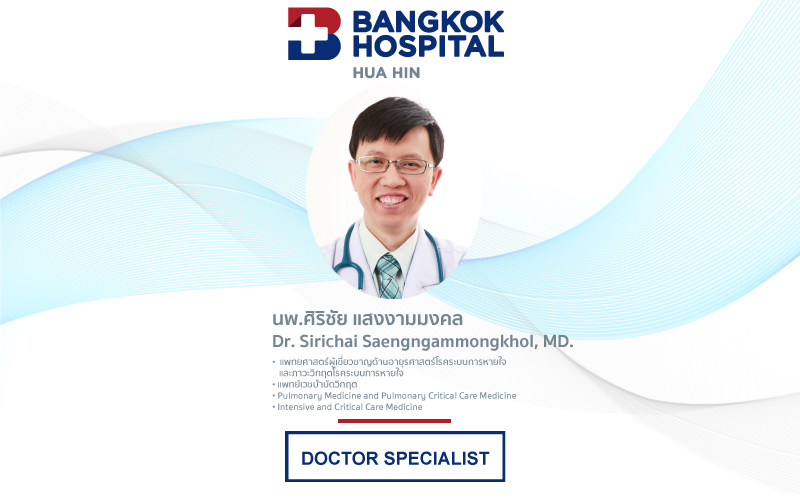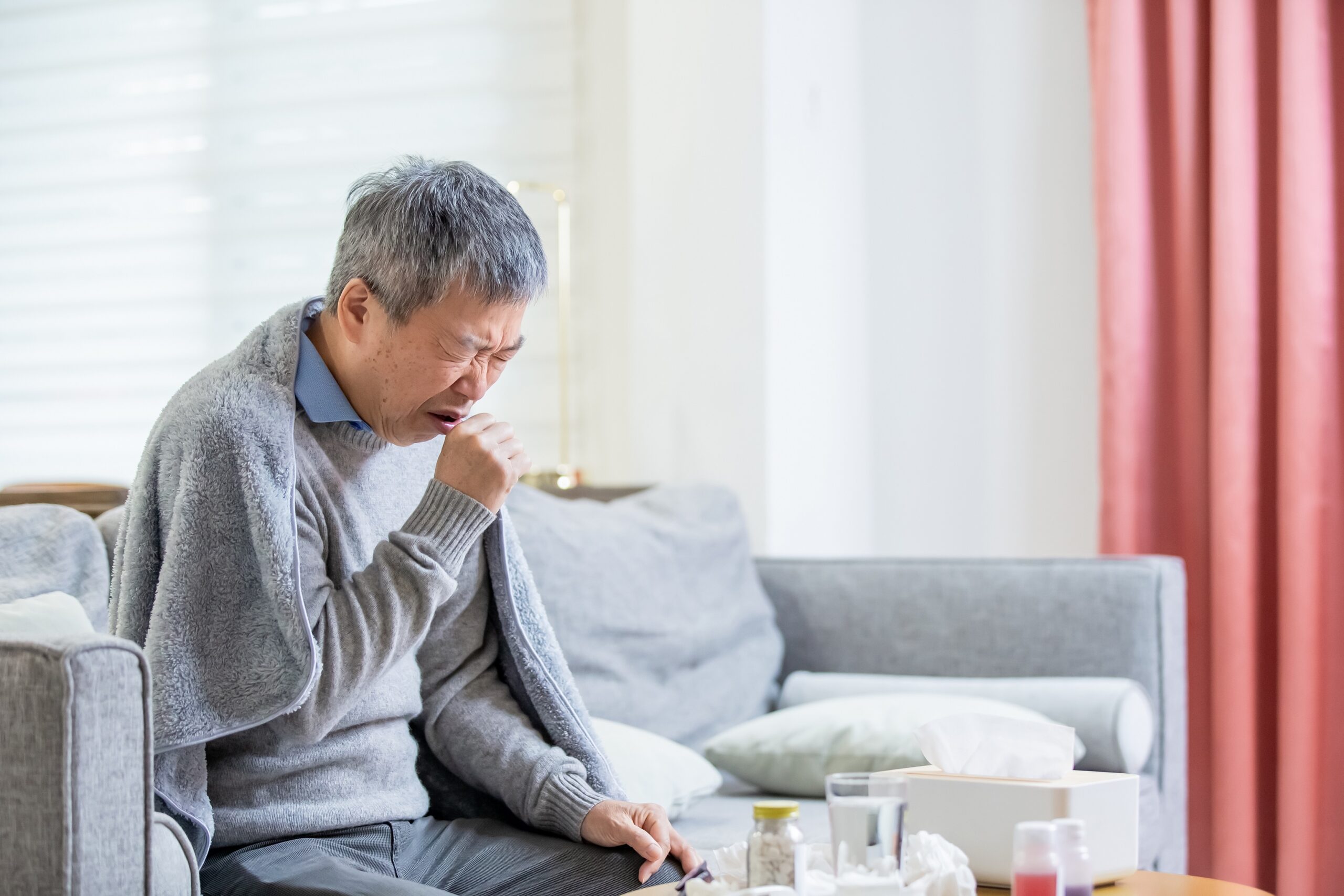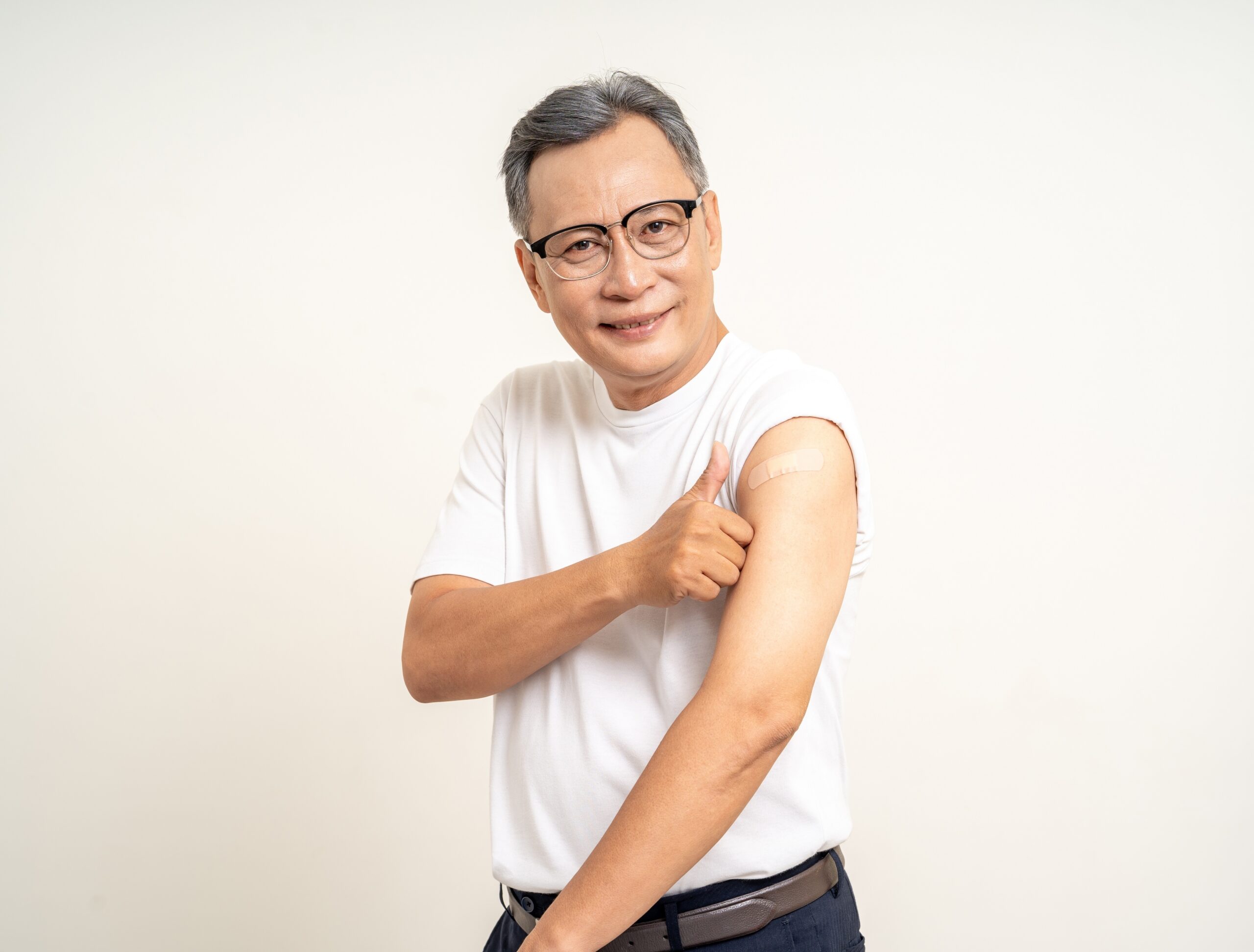The Dangers of RSV in the Elderly
RSV (Respiratory Syncytial Virus) is a leading cause of respiratory infections, affecting people of all ages, from children to adults. However, in older adults, RSV poses a heightened risk due to weakened immune systems and the presence of chronic health conditions commonly associated with aging. Close monitoring and proactive healthcare are essential to protect this vulnerable group and minimize the risk of complications.
Dr. Sirichai Saengngammongkhol, our specialist in pulmonary medicine and pulmonary critical care medicine at Bangkok Hospital Hua Hin, shares that RSV spreads through droplets from coughing or sneezing and by touching contaminated surfaces such as doorknobs, glasses, or towels. Older adults with weakened immune systems are more susceptible to infection.
 RSV symptoms can range from mild cold-like signs to severe respiratory failure (Acute Respiratory Distress). Common symptoms include a runny nose, nasal congestion, and sore throat within 3–5 days of infection. In many cases, the infection spreads to the lower respiratory tract, causing coughing, shortness of breath, wheezing, and potentially pneumonia or respiratory failure, especially in those with weakened immune systems, heart or lung conditions, or a history of smoking.
A major concern is that RSV symptoms may resemble a common cold but develop into severe complications. It can also worsen heart conditions, leading to heart failure, arrhythmia, or heart attack, which can be life-threatening. The general death rate is less than 1%, but for those over 65, it is 7.2 per 100,000 people annually. Additionally, the rate of respiratory failure, ventilation use, or death is 1.39 times higher than for COVID-19 and 2.08 times higher than for influenza.
RSV symptoms can range from mild cold-like signs to severe respiratory failure (Acute Respiratory Distress). Common symptoms include a runny nose, nasal congestion, and sore throat within 3–5 days of infection. In many cases, the infection spreads to the lower respiratory tract, causing coughing, shortness of breath, wheezing, and potentially pneumonia or respiratory failure, especially in those with weakened immune systems, heart or lung conditions, or a history of smoking.
A major concern is that RSV symptoms may resemble a common cold but develop into severe complications. It can also worsen heart conditions, leading to heart failure, arrhythmia, or heart attack, which can be life-threatening. The general death rate is less than 1%, but for those over 65, it is 7.2 per 100,000 people annually. Additionally, the rate of respiratory failure, ventilation use, or death is 1.39 times higher than for COVID-19 and 2.08 times higher than for influenza.
 Currently, there is no specific medication for RSV infections. Treatment is supportive, focusing on symptom management. In older adults, the mortality rate is higher than in children, as they often have underlying health conditions such as coronary artery disease, heart failure, diabetes, kidney disease, and especially respiratory conditions like asthma or chronic obstructive pulmonary disease (COPD). Older adults are more vulnerable to RSV infections in their environment. Therefore, it is important to take preventive measures, including frequent handwashing with soap or alcohol gel, especially after touching public items; avoiding crowded places, particularly during the rainy or winter seasons; wearing masks in public area; staying warm in cold weather; strengthen the immune system by eating nutritious foods, exercising regularly, and following vaccination recommendations, especially for those with underlying conditions, such as the flu and pneumonia vaccines, can help reduce the risk of complications. Additionally, there is now an RSV vaccine for older adults that helps boost immunity and reduce the severity and risk of death from the RSV infection.
Currently, there is no specific medication for RSV infections. Treatment is supportive, focusing on symptom management. In older adults, the mortality rate is higher than in children, as they often have underlying health conditions such as coronary artery disease, heart failure, diabetes, kidney disease, and especially respiratory conditions like asthma or chronic obstructive pulmonary disease (COPD). Older adults are more vulnerable to RSV infections in their environment. Therefore, it is important to take preventive measures, including frequent handwashing with soap or alcohol gel, especially after touching public items; avoiding crowded places, particularly during the rainy or winter seasons; wearing masks in public area; staying warm in cold weather; strengthen the immune system by eating nutritious foods, exercising regularly, and following vaccination recommendations, especially for those with underlying conditions, such as the flu and pneumonia vaccines, can help reduce the risk of complications. Additionally, there is now an RSV vaccine for older adults that helps boost immunity and reduce the severity and risk of death from the RSV infection.
 Who should get the RSV vaccine?
Doctors recommend the RSV vaccine for individuals aged 60 and older, especially those living in households with children and older adults. It is also recommended for those over 50 with underlying conditions such as asthma, COPD, coronary artery disease, heart failure, diabetes, or kidney disease.
Studies show that the RSV vaccine is 94.6% effective in preventing lower respiratory tract infections in high-risk patients with underlying conditions and reduces hospitalization by 75%. Mild side effects may occur, such as injection site pain, fatigue, muscle aches, headaches, and joint pain, usually resolve within 2-3 days. Current studies indicate that the vaccine provides immunity for at least 2.5 years, However, further research is needed to assess booster shot effects.
“RSV should not be overlooked in older adults. While it may start like a common cold, it can progress to severe and even fatal stages. If older adults show symptoms suggesting an RSV infection, they should consult a doctor promptly for proper treatment and to reduce the risk of complications. However, proper healthcare and preventive measures are essential for maintaining good health and enhancing quality of life.” Dr. Sirichai concludes.
**************************************************************************
For more information and booking an appointment, please contact :
Tel. 032-616-800 Call Center, Bangkok Hospital Hua Hin
Tel: 032-616-880 (7.00 – 19.00 hrs.) Out-Patient Department, ground floor
News & Information >> Line ID : @bangkokhuahin
Who should get the RSV vaccine?
Doctors recommend the RSV vaccine for individuals aged 60 and older, especially those living in households with children and older adults. It is also recommended for those over 50 with underlying conditions such as asthma, COPD, coronary artery disease, heart failure, diabetes, or kidney disease.
Studies show that the RSV vaccine is 94.6% effective in preventing lower respiratory tract infections in high-risk patients with underlying conditions and reduces hospitalization by 75%. Mild side effects may occur, such as injection site pain, fatigue, muscle aches, headaches, and joint pain, usually resolve within 2-3 days. Current studies indicate that the vaccine provides immunity for at least 2.5 years, However, further research is needed to assess booster shot effects.
“RSV should not be overlooked in older adults. While it may start like a common cold, it can progress to severe and even fatal stages. If older adults show symptoms suggesting an RSV infection, they should consult a doctor promptly for proper treatment and to reduce the risk of complications. However, proper healthcare and preventive measures are essential for maintaining good health and enhancing quality of life.” Dr. Sirichai concludes.
**************************************************************************
For more information and booking an appointment, please contact :
Tel. 032-616-800 Call Center, Bangkok Hospital Hua Hin
Tel: 032-616-880 (7.00 – 19.00 hrs.) Out-Patient Department, ground floor
News & Information >> Line ID : @bangkokhuahin
 RSV symptoms can range from mild cold-like signs to severe respiratory failure (Acute Respiratory Distress). Common symptoms include a runny nose, nasal congestion, and sore throat within 3–5 days of infection. In many cases, the infection spreads to the lower respiratory tract, causing coughing, shortness of breath, wheezing, and potentially pneumonia or respiratory failure, especially in those with weakened immune systems, heart or lung conditions, or a history of smoking.
A major concern is that RSV symptoms may resemble a common cold but develop into severe complications. It can also worsen heart conditions, leading to heart failure, arrhythmia, or heart attack, which can be life-threatening. The general death rate is less than 1%, but for those over 65, it is 7.2 per 100,000 people annually. Additionally, the rate of respiratory failure, ventilation use, or death is 1.39 times higher than for COVID-19 and 2.08 times higher than for influenza.
RSV symptoms can range from mild cold-like signs to severe respiratory failure (Acute Respiratory Distress). Common symptoms include a runny nose, nasal congestion, and sore throat within 3–5 days of infection. In many cases, the infection spreads to the lower respiratory tract, causing coughing, shortness of breath, wheezing, and potentially pneumonia or respiratory failure, especially in those with weakened immune systems, heart or lung conditions, or a history of smoking.
A major concern is that RSV symptoms may resemble a common cold but develop into severe complications. It can also worsen heart conditions, leading to heart failure, arrhythmia, or heart attack, which can be life-threatening. The general death rate is less than 1%, but for those over 65, it is 7.2 per 100,000 people annually. Additionally, the rate of respiratory failure, ventilation use, or death is 1.39 times higher than for COVID-19 and 2.08 times higher than for influenza.
 Currently, there is no specific medication for RSV infections. Treatment is supportive, focusing on symptom management. In older adults, the mortality rate is higher than in children, as they often have underlying health conditions such as coronary artery disease, heart failure, diabetes, kidney disease, and especially respiratory conditions like asthma or chronic obstructive pulmonary disease (COPD). Older adults are more vulnerable to RSV infections in their environment. Therefore, it is important to take preventive measures, including frequent handwashing with soap or alcohol gel, especially after touching public items; avoiding crowded places, particularly during the rainy or winter seasons; wearing masks in public area; staying warm in cold weather; strengthen the immune system by eating nutritious foods, exercising regularly, and following vaccination recommendations, especially for those with underlying conditions, such as the flu and pneumonia vaccines, can help reduce the risk of complications. Additionally, there is now an RSV vaccine for older adults that helps boost immunity and reduce the severity and risk of death from the RSV infection.
Currently, there is no specific medication for RSV infections. Treatment is supportive, focusing on symptom management. In older adults, the mortality rate is higher than in children, as they often have underlying health conditions such as coronary artery disease, heart failure, diabetes, kidney disease, and especially respiratory conditions like asthma or chronic obstructive pulmonary disease (COPD). Older adults are more vulnerable to RSV infections in their environment. Therefore, it is important to take preventive measures, including frequent handwashing with soap or alcohol gel, especially after touching public items; avoiding crowded places, particularly during the rainy or winter seasons; wearing masks in public area; staying warm in cold weather; strengthen the immune system by eating nutritious foods, exercising regularly, and following vaccination recommendations, especially for those with underlying conditions, such as the flu and pneumonia vaccines, can help reduce the risk of complications. Additionally, there is now an RSV vaccine for older adults that helps boost immunity and reduce the severity and risk of death from the RSV infection.
 Who should get the RSV vaccine?
Doctors recommend the RSV vaccine for individuals aged 60 and older, especially those living in households with children and older adults. It is also recommended for those over 50 with underlying conditions such as asthma, COPD, coronary artery disease, heart failure, diabetes, or kidney disease.
Studies show that the RSV vaccine is 94.6% effective in preventing lower respiratory tract infections in high-risk patients with underlying conditions and reduces hospitalization by 75%. Mild side effects may occur, such as injection site pain, fatigue, muscle aches, headaches, and joint pain, usually resolve within 2-3 days. Current studies indicate that the vaccine provides immunity for at least 2.5 years, However, further research is needed to assess booster shot effects.
“RSV should not be overlooked in older adults. While it may start like a common cold, it can progress to severe and even fatal stages. If older adults show symptoms suggesting an RSV infection, they should consult a doctor promptly for proper treatment and to reduce the risk of complications. However, proper healthcare and preventive measures are essential for maintaining good health and enhancing quality of life.” Dr. Sirichai concludes.
**************************************************************************
For more information and booking an appointment, please contact :
Tel. 032-616-800 Call Center, Bangkok Hospital Hua Hin
Tel: 032-616-880 (7.00 – 19.00 hrs.) Out-Patient Department, ground floor
News & Information >> Line ID : @bangkokhuahin
Who should get the RSV vaccine?
Doctors recommend the RSV vaccine for individuals aged 60 and older, especially those living in households with children and older adults. It is also recommended for those over 50 with underlying conditions such as asthma, COPD, coronary artery disease, heart failure, diabetes, or kidney disease.
Studies show that the RSV vaccine is 94.6% effective in preventing lower respiratory tract infections in high-risk patients with underlying conditions and reduces hospitalization by 75%. Mild side effects may occur, such as injection site pain, fatigue, muscle aches, headaches, and joint pain, usually resolve within 2-3 days. Current studies indicate that the vaccine provides immunity for at least 2.5 years, However, further research is needed to assess booster shot effects.
“RSV should not be overlooked in older adults. While it may start like a common cold, it can progress to severe and even fatal stages. If older adults show symptoms suggesting an RSV infection, they should consult a doctor promptly for proper treatment and to reduce the risk of complications. However, proper healthcare and preventive measures are essential for maintaining good health and enhancing quality of life.” Dr. Sirichai concludes.
**************************************************************************
For more information and booking an appointment, please contact :
Tel. 032-616-800 Call Center, Bangkok Hospital Hua Hin
Tel: 032-616-880 (7.00 – 19.00 hrs.) Out-Patient Department, ground floor
News & Information >> Line ID : @bangkokhuahin